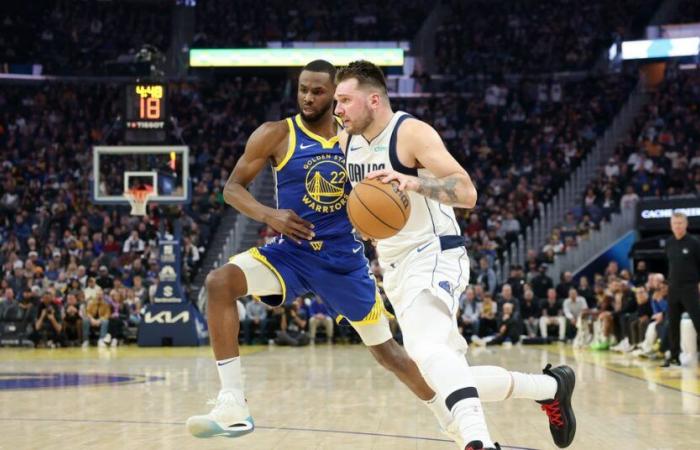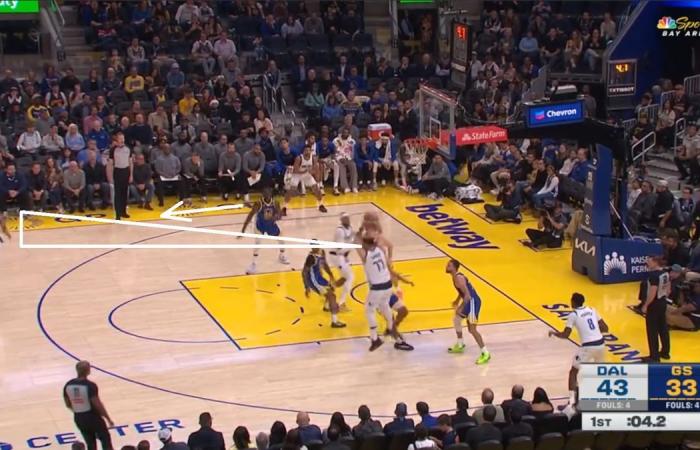Despite the historical success Andrew Wiggins has had as a Luka Dončić defender (“success” being used in this instance in relative terms), there was absolutely no guarantee of Wiggins and the Golden State Warriors seeing the same success they previously had against one of the best players in the NBA. What makes Dončić deserve that billing isn’t just due to his off-speed scoring game — but also because of how he takes advantage of defenses attempting to stop his scoring.
Take note of one particular possession (14 seconds left in the first quarter) in the Warriors’ 143-133 loss to the Dallas Mavericks, in which Dončić had a triple double: 45 points, 11 rebounds, and 13 assists on a highly efficient 83.5% True Shooting mark. The Warriors were off to an inauspicious start, to say the least; the Mavericks scored on their first 12 possessions of the game. From the very beginning, the Warriors were fighting an uphill battle that involved coverage plans being torn up, plan Bs being resorted to at a point of the game where it’s usually too early to unholster them, and finding themselves in constant rotation during scramble situations.
Those scramble situations, more often than not, were created by Dončić at the point of attack and dictated by the coverage that the Warriors decided to play against him. Throughout the night, they attempted to send two to the ball against Dončić and took the risk of being in rotation everywhere else, banking on their ability to close the gaps created by everyone having to cover a wide swath of floor area. Early on in the season, the Warriors were able to cover those areas with little problem; against Dončić, one of the best at picking apart aggressive coverages, it was a highly risky endeavor, but one they felt they needed to do in order to take the ball out of Dončić’s hands.
As such, they chose to take the ball out of Dončić’s hands in this instance. Gary Payton II and Trayce Jackson-Davis jump out toward Dončić and attempt to shade him toward the sideline and away from the middle of the floor. Take note of the weak-side configuration consisting of Brandin Podziemski as the low man and Draymond Green splitting the difference and zoning up between two players:
Podziemski is doing as he should as the low man: tagging the roller (Daniel Gafford) to take away the roll option; otherwise, Dončić would easily find Gafford for the wide-open dunk. Green’s job is to monitor two players (Spencer Dinwiddie and Quentin Grimes) and rotate toward the ball should Dončić decide to skip it toward the wing or corner. In order to do his job properly, Green not only has to keep tabs on his two assignments — he has to look at Dončić’s eyes and see where he looks at in order to get the jump.
When Dončić has to make his decision, Dinwiddie relocates from the wing to the top of the key in order to stretch Green thin, which makes his close out either way longer and harder to execute. To make matters worse for Green, peep at how Dončić uses his eyes to look at Dinwiddie — prompting Green to start his move toward the top of the key:
The moment Green takes the ocular bait is the moment Dončić wins this possession. With Podziemski committed to the tag in order to take away the roll, he is in no position to make a viable close out toward Grimes, who becomes the recipient of Dončić’s sublime no-look pass.
Result: Grimes drills one of the Mavericks’ 21 made threes and one of 48 combined (the most threes made in one game in NBA history) from both teams (27 from the Warriors — the most a losing team has made in NBA history):
The easy party to throw the blame at for the possession above would be Podziemski, who has had his fair share of problems in terms of overhelp and off-ball defense. But this instance is not one to blame him for; tagging the roll is a typical decision from the low man that is prevalent in the NBA. Is Green to be blamed, then, you would ask? I would also say that Green is blameless in this instance; Dončić’s manipulation chops as a passer in the pick-and-roll is second to none, and even the best defender of this generation is prone to his diabolical playmaking. This is simply Dončić being — as previously stated — one of the best players in the world.
On a more conventional spread pick-and-roll possession — with Dončić seeing another two-to-the-ball coverage — peep at Steph Curry (the low man in this instance) taking Dereck Lively II’s roll by tagging:
Dončić is met with enough length to force him to resort to the simplest read, which is to pass the ball to Lively in the short roll. With Curry rotating to put himself in between Lively and the rim, Lively is forced to pass out to the wing. Wiggins is in position to rotate toward the pass, but PJ Washington’s extra swing pass to Klay Thompson in the corner creates an additional close out for Curry — starting from a position of disadvantage in which he had to rotate deep in the paint for the tag. Thompson promptly takes advantage by drilling the corner three with plenty of time and space against his former Splash Brother.
The Warriors responded by changing their coverages and decisions concerning the roller, and they also paid for it dearly. If no tag exists, they would be giving up a wide-open dunk, especially if the coverage up front doesn’t account for the change in the back. Peep at how Jonathan Kuminga “ices” Dinwiddie toward the sideline, with Kevon Looney stepping up higher than a conventional deep drop to help contain the ball. Lively rolls toward the middle — with the expectation being that the low man in this instance (Curry) would pinch in to tag Lively and force a long skip pass to the weak side.
However:
Curry’s decision to stay home instead of tagging Lively — while Kuminga and Looney are virtually putting two to the ball against Dinwiddie — results in Lively getting a wide-open dunk. Such is the consequence of choosing not to tag, as opposed to the consequence of choosing to tag and being victimized by an otherworldly pass from an otherworldly player as previously seen.
The execution of the tag also matters. If the tag is half-hearted or late, it can also give up easy looks at the rim:
But the Mavs — arguably the hottest team in the league at 12-3 over their last 15 games — came into this game with an established offensive identity. That identity consisted of spreading the floor, occasionally shifting on-ball responsibility from Dončić toward Kyrie Irving, Dinwiddie, and even the likes of Washington, and moving chess pieces around. The deadliest piece of them all in the form of Dončić was even willing to stand pat off the ball and wait for it to come to him off of an advantage created by a teammate:
With Wiggins having to detach from Dončić in order to tag the roll, Dončić makes the prospect of a recovery close out tough by “shaking” or lifting from the corner to the wing. Wiggins tries to fly at Dončić with the hopes of affecting his rhythm, but to no avail.
That said, this wasn’t merely a matter of better offense bypassing a good defense. The Warriors definitely had moments of spotty decision making on defense that led to the Mavs establishing a freight-train momentum that became near impossible to stop in its tracks. For one, Kuminga choosing to go over on the screen above for Washington — a screen that was set near the half-court line, mind you — didn’t do Wiggins any favors.
There’s also the decision to employ aggressive two-to-the-ball coverages against anyone not named Dončić or Irving. Deciding to double Dinwiddie and treating him as an equal danger to the former two is putting yourself in unnecessary rotation situations where a simpler or more conservative approach was warranted:
With Dončić putting up a 40-plus-point triple double, Thompson torching the nets with 29 points on 89.5% True Shooting, and Irving chipping in with 21 points on 57.7% True Shooting, the Warriors found it extremely difficult to find a base coverage on defense they could reliably fall back on. Constantly shuffling through coverage options and finding each and every one of them being countered wasn’t certainly on their bingo card tonight. Such is the way of life against a team that not only has plenty of offensive weapons but also knows how to maximize them to the highest degree. Mistakes were most certainly made — but the Warriors were tagged with an offensive flurry that all started with a consequential and literal “tag” on the roll man.







